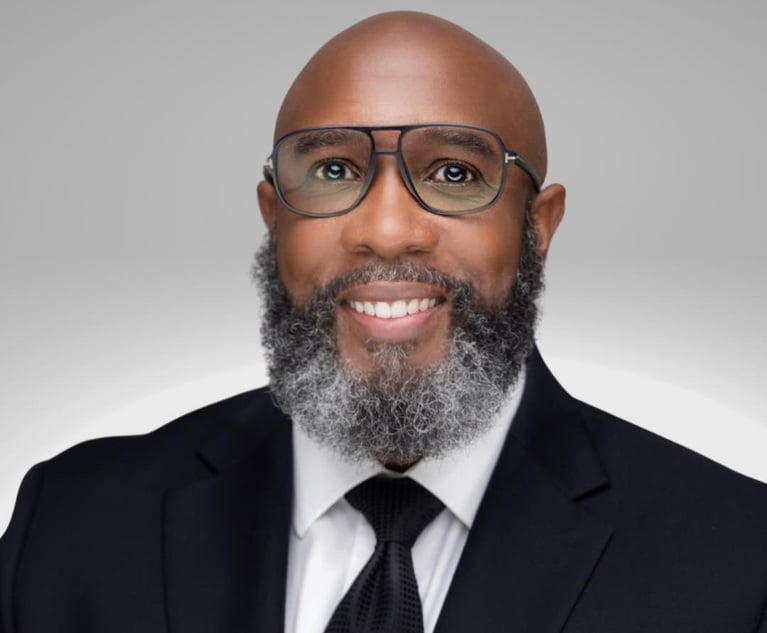How Miami Lawyer Corey Lee E-Discovered Himself, And Why You Should Too
"There's really a lot of great information and great stories to be told if lawyers are willing to think about all the technology and all the information sources that are available to them and how they can really help them in their cases," said Corey Lee, partner at Hunton Andrews Kurth.
July 06, 2020 at 01:04 PM
8 minute read
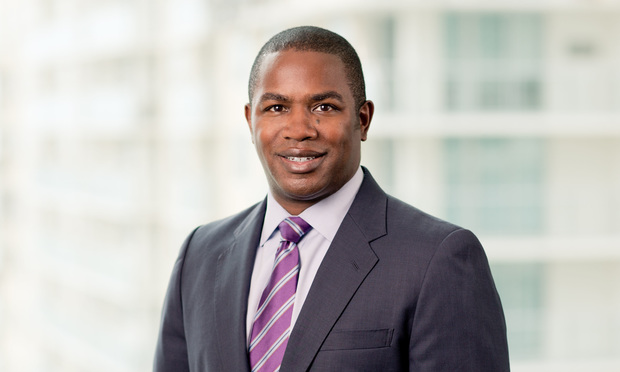 Corey Lee of Hunton Andrews Kurth in Miami. Courtesy photo.
Corey Lee of Hunton Andrews Kurth in Miami. Courtesy photo.
As a young associate at Simpson Thacher & Bartlett in New York City working on a massive antitrust case, Corey Lee knew it wouldn't be easy to land more responsibility, visibility and unique experiences, so he actively looked for a gap to fill.
And before long: an opportunity, as the junior partners on the case asked if Lee wanted to tag along to the CEO of MasterCard Inc.'s office to collect documents. The credit card company, along with Visa, faced allegations from American Express Co. and Discover Financial Services that they'd blocked banks from issuing competitors' cards.
With help from a mentor and hired vendors, Lee soon realized that e-discovery and document management was in need of extra hands, and could give a young lawyer some independence.
"I went from being someone who was attending the conference to someone who was speaking at the conferences in a decent amount of time, just because I saw a place where there was a real need for expertise," Lee said.
Now a partner at Hunton Andrews Kurth, Lee is widely considered an expert on e-discovery and handles consumer class actions for retail clients and litigation surrounding government investigations.
'Using data to tell a story'
E-discovery is about ensuring relevant information is preserved and incorporated into legal strategies as efficiently as possible, by "using data to tell a story," according to Lee, who said it's also something lawyers get wrong a lot.
"I think lawyers are, for the most part, technology averse, and think this is something they can either delegate to their vendor or delegate to the client without spending a lot of time on it," Lee said. "But it really is something that does require a lot of lawyer oversight if done right."
The No. 1 thing lawyers slip up on with e-discovery, in Lee's experience, is the preservation of information — something they have a duty to do on reasonable anticipation of litigation.
"That seems easy enough," Lee said. "Most of the time, lawyers send out a letter to their clients that says, 'Preserve the relevant documents,' but they don't take any effort to really understand how their clients use and create information, so that they really don't know if the steps taken by their client are reasonable and they don't understand how the communication comes."
If an employee is suspected of trade secret theft, for example, Lee says going through their emails might not produce much. But a forensic analysis of what files they've pulled, what sites they've accessed and where they've been sending and storing information? That might answer some burning questions.
Instead of just focusing on emails, Lee said lawyers can benefit from asking clients how they're actually working with and using technology.
"There's really a lot of great information and great stories to be told if lawyers are willing to think about all the technology and all the information sources that are available to them and how they can really help them in their cases," Lee said.
When one client faced a putative class action over allegedly defective furniture covering, for example, Lee's team pulled data on all customer complaints and returns. That revealed very few customers reported issues, and they were all different, meaning the plaintiffs' case didn't fit the uniform set of factors necessary for a class action.
Lee is undaunted by the unknown, according to Hunton Andrews Kurth partner John Delionado, who said he was point person on two of the firm's biggest cases: one involving a data breach that impacted 3 billion Yahoo users worldwide, and another involving a government investigation into fees associated with military housing, in which the firm represents construction company Balfour Beatty.
"He's unafraid to branch out into new areas of law and it's really his desire to deliver great client services that's caused him to become an expert in e-discovery," Delionado said. "He's carved out a unique practice area for himself and is the go-to person. There's something for just about any young lawyer to gain from his experience."
One client at a multinational company who prefers to remain anonymous said Lee is always out "issue-hunting" for it and "abounds with energy, enthusiasm and intelligence."
"I rely on Corey to guide us on retention and e-discovery as new technologies emerge and are adopted," the client said. "He is the epitome of a trusted adviser."
'You're going to meet him'
Lee grew up in Kansas City, Missouri, with parents who were big believers in taking advantage of community resources and reaching out to those who are thriving in the ways you want to be.
Lee's original plan was to be a pilot. And yes, he knows that's a cliché.
"Everyone wants to be a pilot, but I actually was meeting with my local members of Congress and visiting the Air Force Academy to figure out what it took to get an appointment," he said.
But when Lee's eyesight took a turn for the worse toward the end of high school, he looked to the legal sector. Specifically, to a profile in the newspaper of Les Parette, a local attorney who'd just made partner.
"My mom saw his profile in the paper and was like, 'This guy went to Harvard undergrad, Harvard Law. We're going to call him and you're going to go meet him,' " Lee said. " My mom was of the mindset that the worst someone can do is say, 'No.' "
That translated into a summer job at the firm's accounting department, where Lee got more exposure to attorneys and found a lifelong mentor and future boss in Parette, now vice president and general counsel at Novelis.
Lee majored in history at Yale University, where he'd lose himself in the rare-books library, researching modern American religious history.
" I really enjoyed the opportunity to go back, look at primary sources and see what stories had kind of been left out of the history books, and figure out what narratives there were to tell that had kind of been missed in mainstream history," Lee said.
Lee has also served on the Leadership Council on Legal Diversity, which aims to create a legal profession "that looks like the communities we're trying to serve."
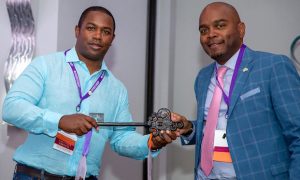 Corey Lee, left, at the 2019 LCLD Leadership Symposium, with Gerard Gregoire accepting the Participation is Key Award. Courtesy photo.
Corey Lee, left, at the 2019 LCLD Leadership Symposium, with Gerard Gregoire accepting the Participation is Key Award. Courtesy photo.There, Lee met Gerard Gregoire, vice president and assistant general counsel for Allstate's litigation services West region. He says Lee is the kind of attorney who'll call clients unprompted with insights about industry trends, or work until 3 a.m. despite a 6 a.m. start — and stay cool in a crisis.
"We've had situations where we have had a privacy concern, and the ability to reach out to Corey and get feedback that puts it into perspective in practical terms has been very helpful for me and my company in terms of being able to lean on him for his expertise," Gregoire said. "And he's very calm when he gives that to you. Because, a lot of times, when you have that situation, you're getting a call from your CEO. They're not calm."
Lee is a former president of the board for the Miami-Dade chapter of AMI Kids, and, believing it's his turn to "pay forward and share my experiences," Lee mentors aspiring lawyers and professionals, many of whom are the first in their family to go to college.
Corey Lee
Born: November 1977, Kansas City, Missouri
Spouse: Meg Lee
Children: Ethan and Ella Lee
Education: Duke University, J.D., 2004; Yale University, B.A., 2000
Experience: Litigation partner, Hunton Andrews Kurth, 2015-present; Litigation associate, Hunton Andrews Kurth, 2007-2015; Litigation associate, Simpson Thacher & Bartlett, 2005-2007; Judicial clerk, Chief U.S. District Judge John Lungstrum in the District of Kansas, 2004-2005.
More profiles:
Want to Create a Social Media Following? Here's How Miami Lawyer Frank Ramos Jr. Did it
Before Jeffrey Epstein's Victims Had a Case, They Had Boies Schiller Veteran Sigrid McCawley
This content has been archived. It is available through our partners, LexisNexis® and Bloomberg Law.
To view this content, please continue to their sites.
Not a Lexis Subscriber?
Subscribe Now
Not a Bloomberg Law Subscriber?
Subscribe Now
NOT FOR REPRINT
© 2025 ALM Global, LLC, All Rights Reserved. Request academic re-use from www.copyright.com. All other uses, submit a request to [email protected]. For more information visit Asset & Logo Licensing.
You Might Like
View All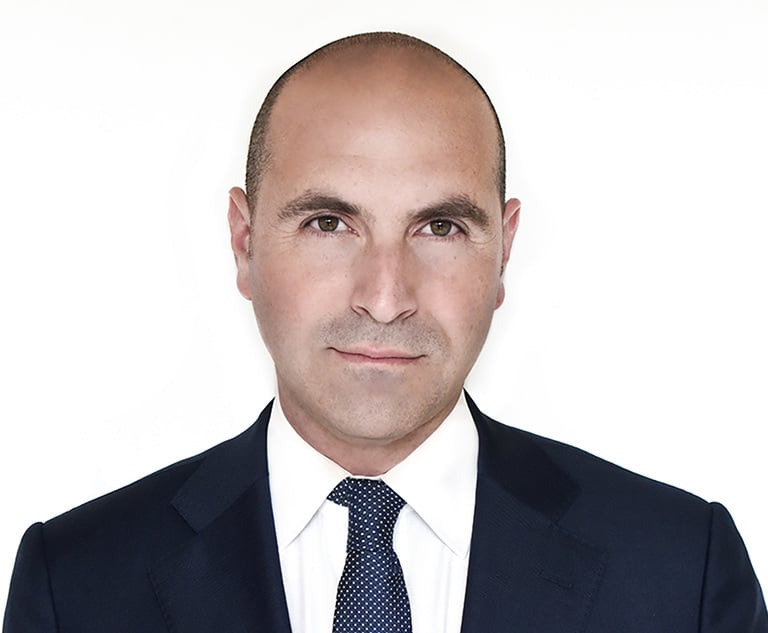
Growing Referral Network, Alternative Fees Have This Ex-Big Law’s Atty’s Bankruptcy Practice Soaring
5 minute read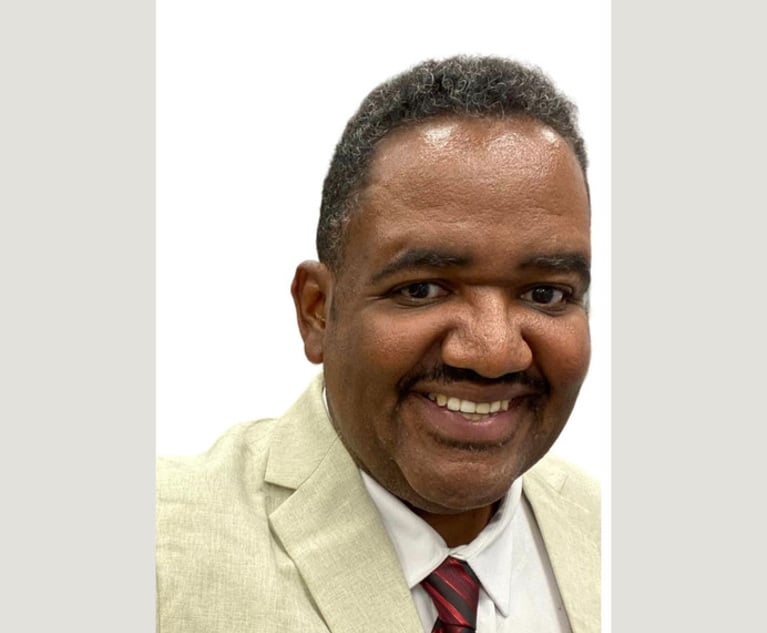
Against the Odds: Voters Elect Woody Clermont to the Broward Judicial Bench
4 minute read
Miami Civil Judge Myriam Lehr to Say Goodbye to the County Court Bench
4 minute readLaw Firms Mentioned
Trending Stories
- 1Troutman Pepper, Claiming Ex-Associate's Firing Was Performance Related, Seeks Summary Judgment in Discrimination Suit
- 2Law Firm Fails to Get Punitive Damages From Ex-Client
- 3Over 700 Residents Near 2023 Derailment Sue Norfolk for More Damages
- 4Decision of the Day: Judge Sanctions Attorney for 'Frivolously' Claiming All Nine Personal Injury Categories in Motor Vehicle Case
- 5Second Judge Blocks Trump Federal Funding Freeze
Who Got The Work
J. Brugh Lower of Gibbons has entered an appearance for industrial equipment supplier Devco Corporation in a pending trademark infringement lawsuit. The suit, accusing the defendant of selling knock-off Graco products, was filed Dec. 18 in New Jersey District Court by Rivkin Radler on behalf of Graco Inc. and Graco Minnesota. The case, assigned to U.S. District Judge Zahid N. Quraishi, is 3:24-cv-11294, Graco Inc. et al v. Devco Corporation.
Who Got The Work
Rebecca Maller-Stein and Kent A. Yalowitz of Arnold & Porter Kaye Scholer have entered their appearances for Hanaco Venture Capital and its executives, Lior Prosor and David Frankel, in a pending securities lawsuit. The action, filed on Dec. 24 in New York Southern District Court by Zell, Aron & Co. on behalf of Goldeneye Advisors, accuses the defendants of negligently and fraudulently managing the plaintiff's $1 million investment. The case, assigned to U.S. District Judge Vernon S. Broderick, is 1:24-cv-09918, Goldeneye Advisors, LLC v. Hanaco Venture Capital, Ltd. et al.
Who Got The Work
Attorneys from A&O Shearman has stepped in as defense counsel for Toronto-Dominion Bank and other defendants in a pending securities class action. The suit, filed Dec. 11 in New York Southern District Court by Bleichmar Fonti & Auld, accuses the defendants of concealing the bank's 'pervasive' deficiencies in regards to its compliance with the Bank Secrecy Act and the quality of its anti-money laundering controls. The case, assigned to U.S. District Judge Arun Subramanian, is 1:24-cv-09445, Gonzalez v. The Toronto-Dominion Bank et al.
Who Got The Work
Crown Castle International, a Pennsylvania company providing shared communications infrastructure, has turned to Luke D. Wolf of Gordon Rees Scully Mansukhani to fend off a pending breach-of-contract lawsuit. The court action, filed Nov. 25 in Michigan Eastern District Court by Hooper Hathaway PC on behalf of The Town Residences LLC, accuses Crown Castle of failing to transfer approximately $30,000 in utility payments from T-Mobile in breach of a roof-top lease and assignment agreement. The case, assigned to U.S. District Judge Susan K. Declercq, is 2:24-cv-13131, The Town Residences LLC v. T-Mobile US, Inc. et al.
Who Got The Work
Wilfred P. Coronato and Daniel M. Schwartz of McCarter & English have stepped in as defense counsel to Electrolux Home Products Inc. in a pending product liability lawsuit. The court action, filed Nov. 26 in New York Eastern District Court by Poulos Lopiccolo PC and Nagel Rice LLP on behalf of David Stern, alleges that the defendant's refrigerators’ drawers and shelving repeatedly break and fall apart within months after purchase. The case, assigned to U.S. District Judge Joan M. Azrack, is 2:24-cv-08204, Stern v. Electrolux Home Products, Inc.
Featured Firms
Law Offices of Gary Martin Hays & Associates, P.C.
(470) 294-1674
Law Offices of Mark E. Salomone
(857) 444-6468
Smith & Hassler
(713) 739-1250





